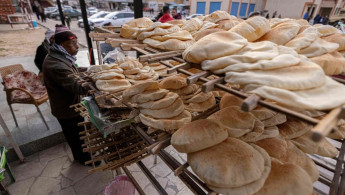Egypt to sell discounted bread to fight inflation
Egypt's government will start selling discounted bread to people not enrolled in its bread subsidy programme as it battles accelerating inflation, the supply minister said on Monday.
People will be able to buy 90g loaves at cost price using pre-paid cards, Ali Moselhy said, adding the price was yet to be decided but would be less than 1 Egyptian pound ($0.03), with a trial period starting on Wednesday.
"The point is to make this important commodity available without any exaggeration in profits by commercial bakeries," he said.
Last December, the IMF said that Egypt's IMF program included policies aimed at reducing inflation in Egypt. How is that working? Like many IMF programs: NOT WELL. Today, I measure inflation in Egypt at a punishing 88%/yr. pic.twitter.com/6l9ZH2LFTH
— Steve Hanke (@steve_hanke) January 11, 2023
Egypt's government already provides heavily subsidised bread to more than 70 million of its 104 million citizens. Plans to reform the subsidies were postponed as a foreign currency shortage and inflation were exacerbated by the fallout from the war in Ukraine.
The latest decision could increase the amount of bread sold by the government by up to 10 percent, Moselhy said.
It was unclear if this would require the country's state grains buyer, the General Authority for Supply Commodities (GASC), to increase imports. Separately, Moselhy said that following the recent approval of World Bank funding, GASC would "tender every week, God willing".
Egypt is one of the world's largest wheat importers, but private sector importers and mills have struggled in past months to pay for hundreds of thousands of tonnes of wheat stuck at ports, causing a spike in bread and flour prices.
Inflation has accelerated to five-year highs, and the currency has lost nearly 50 percent of its value since March 2021 as the government negotiated a $3 billion financial support package from the International Monetary Fund.
GASC had already started selling flour to private mills, as well as around 300,000 tonnes of wheat via a newly launched commodities exchange, to try to ease internal trade blockages.
Corn will also be sold on the exchange, Moselhy said, in order to address a feed shortage that led some farmers to cull chicks. His comments follow the announcement of a rare tender for yellow corn by GASC on Sunday.
Egypt aimed to procure about 4 million tonnes of wheat in its local harvest season which begins in April, Moselhy added. Last year the government said it procured 4.2 million tonnes.
(Reuters)





 Follow the Middle East's top stories in English at The New Arab on Google News
Follow the Middle East's top stories in English at The New Arab on Google News


